The Omer is the 49-day period between the celebration of Passover and the Festival of Shavuot. Beginning with Passover’s celebration of our liberation from Egypt, it became the custom to count the 49 days of the grain harvest leading to Shavuot, marking each step in our journey to Mount Sinai to receive the gift of Torah and revelation.
Temple Beth El will mark the counting of the Omer this year through the wisdom of Rabbi Karyn Kedar’s book Omer: A Counting. Each of the seven weeks of the Omer will focus on a theme related to growing our spiritual awareness and liberating ourselves from all that keeps us from feeling a sense of spiritual wholeness.
This week’s theme is DECIDE.

With fortitude, determination, and focus, we can decide that the way we are living, thinking, behaving no longer serves us, and it is time to try another way. This is not a small matter. We try to shift from familiar and uncomfortable patterns. We find ourselves affirming our decisions and refining them over and over. As quickly as we decide to embark on a path, we often become confused. It is a continual cycle. So many voices prevail upon our good intentions. Which voice to listen to? And to what end?
בָּרוּךְ אַתָּה יְיָ אֱלֹהֵֽינוּ מֶֽלֶךְ הָעוֹלָם, אֲשֶׁר קִדְּשָֽׁנוּ בְּמִצְוֹתָיו, וְצִוָּֽנוּ עַל סְפִירַת הָעֹֽמֶר
Baruch Ata Adonai Eloheinu Melech HaOlam Asher Kidshanu B’Mitzvotav V’Tzivanu Al Sefirat HaOmer.
Blessed are You, Adonai our God, Ruler of the Universe, who sanctifies us with mitzvot, and commands us concerning the counting of the Omer.
Moses asked, Who am I that I should go?… And God said, I will be with you. (Exodus 3:11-12)
Questions to Consider:
- Why are you deciding to embark on this journey of counting?
- Where are you in this moment of your life?
- What keeps you there?
*The Omer begins in the evening of April 6.
Early one morning I raised my sails and tacked ouf the the canal, not sure where I wanted to go. When I reached the open water, I decided not to cross the bay to the barrier beach, as was my custom, but to hug the mainland. I turned eastward toward the climbing sun and made a long run past familiar landmarks…
The heat of August was on the land and a rich, deep foliage covered the shore. Through the leaves I could see occasional signs of civilization: a chimney, a gas tank, a water tower, a church steeple. I lived there, along with thousands of others, somewhere beyond the tree line in that suburban town. But from the sea, under the sail of my sloop, the coast looked sparsely settled, barely touched by human habitation and still pristine…
But as soon as I reached the open water, I found myself faced with a familiar dilemma; this freedom I cherished came with a precondition: I had to decide where I wanted to go.
Richard Bode, First You Have to Row a Little Boat:
Reflections on Life and Living
Questions to Consider:
- Where are you deciding to go?
- How do you decide?
Do not recall what happened before, do not dwell on the past. I am about to do something new; It shall flourish, you will see! I will forge a path through the desert, and rivers shall flow in the wilderness. (Isaiah 43:18-19)
Question to Consider:
- How can your past inspire your future decisions?
A voice calls out: “You must!”
Must what? O voice, explain!
Instead of an answer I hear
That call again.
I peer behind the door,
I dash at every wall;
I search, though no one strange
Has sent that call.
I’ve known them all my life,
The caller and his call,
Yet it seems to me I hear
What I never heard at all.
It cries: “You must! You must!”
And only God can tell
Whether must is my redemption,
Or must will be my hell.
“A Voice Calls Out” by H. Leivick,
Translated by Cynthia Ozick, in A Treasury of Yiddish Poetry,
Edited by Irving Howe and Eliezer Greenberg
Questions to Consider:
- What do you need in order to be able answer a call?
- Where is God in our ability to decide?
Most people assume that our breathing function is a two-part rhythm of exhalation and inhalation, but this is not the case. The breathing rhythm has three components: the exhalation, a pause, and the inhalation. The pause gives us a rest from the effort of the exhalation, and enables us to rally the energy needed for the next inhalation. The pause is not an idle period when nothing happens, but a vital phase in the breathing process.
If we interfere with the length of the breathing pause, shortening it even slightly, we find ourselves feeling rushed and pressured. A full-length pause in your breathing rhythm will have a calming effect and engender a feeling of relief, eradicating the sensation of being under pressure. However you should not try to make the pause willfully, as its duration must vary with your different breathing needs at different times. What you should do is try to become aware of any ways in which you might be inhibiting the pause, thereby generating feelings of stress.
Avraham Greenbaum, Under the Table & How to Get Up:
Jewish Pathways of Spiritual Growth
Questions to Consider:
- What happens when we decide to pause?
- How can pause and rest be intentional?
Our most abiding legacy lies within the strength of our character. And it may just be an ironic twist of fate that character is best built and measured when we experience conflict, adversity, and failure. Not that success is without its test of courage and integrity. But when we fail– and we all do– we experience a profound moment of loss, which is layered and nuanced. In failure, we may lose the game we are failing, our work, our livelihood, a relationship, a power struggle. And even more crippling, we may lose confidence, a positive self-image, optimism, stability, good cheer, which knocks us off-balance, off our mark. Herein lies the test of character: in the effort to regain composure, balance, direction, our footing. How we react, respond, rebound is a measure of our inner strength, our character, our fortitude, our inner vision of what is possible despite the outer collapse of what was.
It is the motion of regaining balance that the strength of our character is formed, forged, and molded.
Rabbi Karyn Kedar
Questions to Consider:
- How might you decide to respond positively in the face of failure?
- What does that look like?
My soul is quiet, Awaiting God. (Psalm 62:2)
Question to Consider:
- What are you waiting for?








